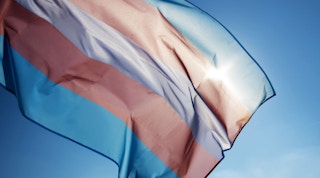Cookies in use
BREAKING: First Anti-Trans Bill of 2021 Heads to Mississippi Governor’s Desk
by Wyatt Ronan •

Today, Mississippi passed SB 2536, an anti-transgender sports bill. This bill marks the first piece of specifically anti-transgender legislation this year to be sent to a governor’s desk and comes on the same day the first piece of anti-LGBTQ legislation, SB 124 — a broad sweeping religious refusal bill — passed the second chamber in South Dakota. The legislative fight to pass discriminatory anti-transgender legislation has been fast and furious, led by national groups aiming to stymie LGBTQ progress made on the national level and in many states. There are so far 131 anti-LGBTQ bills under consideration in state legislatures across the country. Of those, 71 directly target transgender people and about half of those would, like SB 2536, ban transgender girls and women from participating in sports consistent with their gender identity.
As thousands die each day of COVID-19 and millions of Americans are out of work, some state legislatures have chosen to attack, demean and dehumanize their constituents rather than focus on delivering relief and assistance. These dangerous bills are designed to make the lives of transgender kids more difficult while they try to navigate their adolescence. Anti-transgender legislation being heard and voted on across the country are legislating against problems that simply do not exist - as even their proponents admit. This is just the latest iteration of their losing fight against equality and a shameful attempt to throw a wrench in the progress we’re making with a pro-equality President and Congress.
Today, in sending SB 2536 to Governor Reeves, Mississippi became the first state to take the plunge by passing legislation specifically attacking transgender children. Mississippi is so determined to be on the wrong side of history that it is defying the evidence in favor of discrimination. There is simply no justification for banning transgender girls and women from participating in athletics other than discrimination. Like all girls, transgender girls just want to play and be part of a team with their friends. History will not look kindly on this moment in Mississippi.
These bills are not addressing any real problem, and they’re not being requested by constituents. Rather, this effort is being driven by national far-right organizations attempting to score political points by sowing fear and hate. What they don’t understand is opposing equality is highly unpopular — even among Trump voters — and states that pass legislation that attacks our community will face severe economic, legal, and reputational harm. In many cases, these legislative pushes are being prioritized above COVID-19 response and relief. This push comes as equality measures gain not only popular support but legislative momentum on the federal level, with the Biden Administration championing equality in early Executive Actions and Congress considering the Equality Act within the first 100 days of the new Administration.
A fight driven by national anti-LGBTQ groups, not local legislators or public concern
These bills come from the same forces that drove previous anti-equality fights by pushing copycat bills across state houses — hateful anti-LGBTQ organizations like the Heritage Foundation, Alliance Defending Freedom (designated by Southern Poverty Law Center as a hate group), and Eagle Forum among others.
- For example, Montana’s HB 112, the first anti-transgender sports bill to be passed through a legislative chamber in any state, was worked on by the Alliance Defending Freedom.
Trans equality is popular: Anti-transgender legislation is a low priority, even among Trump voters
In a 10-swing-state poll conducted by the Human Rights Campaign & Hart Research Group last fall:
- At least 60% of Trump voters across each of the 10 swing states say transgender people should be able to live freely and openly.
- At least 87% of respondents across each of the 10 swing states say transgender people should have equal access to medical care, with many states breaking 90% support
- When respondents were asked about how they prioritized the importance of banning transgender people from participating in sports as compared to other policy issues, the issue came in dead last, with between 1% and 3% prioritizing the issue.
States that pass anti-transgender legislation suffer economic, legal, reputational harm
Analyses conducted in the aftermath of previous divisive anti-transgender bills across the country, like the bathroom bills introduced in Texas and North Carolina and an anti-transgender sports ban in Idaho, show that there would be or has been devastating fallout.
- Idaho is the only state to have passed an anti-trans sports ban to date, and that law was swiftly suspended by a federal district court. The National Collegiate Athletic Association (NCAA) came out against the Idaho bill and others like it and subsequently moved planned tournament games out of Idaho.
- The Associated Press projected that the North Carolina bathroom bill could have cost the state $3.76 billion over 10 years.
- During a fight over an anti-transgender bathroom bill in 2017, the Texas Association of Business estimated $8.5 billion in economic losses, risking 185,000 jobs in the process due to National Collegiate Athletic Association (NCAA) and professional sporting event cancellations, a ban on taxpayer funded travel to those states, cancellation of movie productions, and businesses moving projects out of state.
Contact Us
To make a general inquiry, please visit our contact page. Members of the media can reach our press office at: (202) 572-8968 or email press@hrc.org.
Love conquers hate.
Image:
Wear your pride this year.
100% of every HRC merchandise purchase fuels the fight for equality.